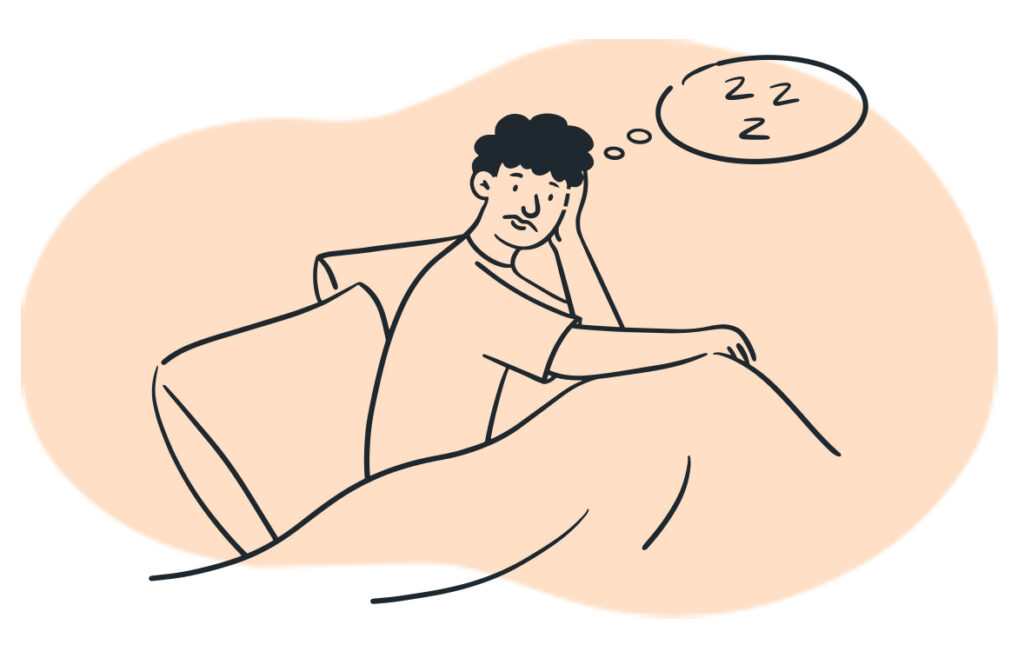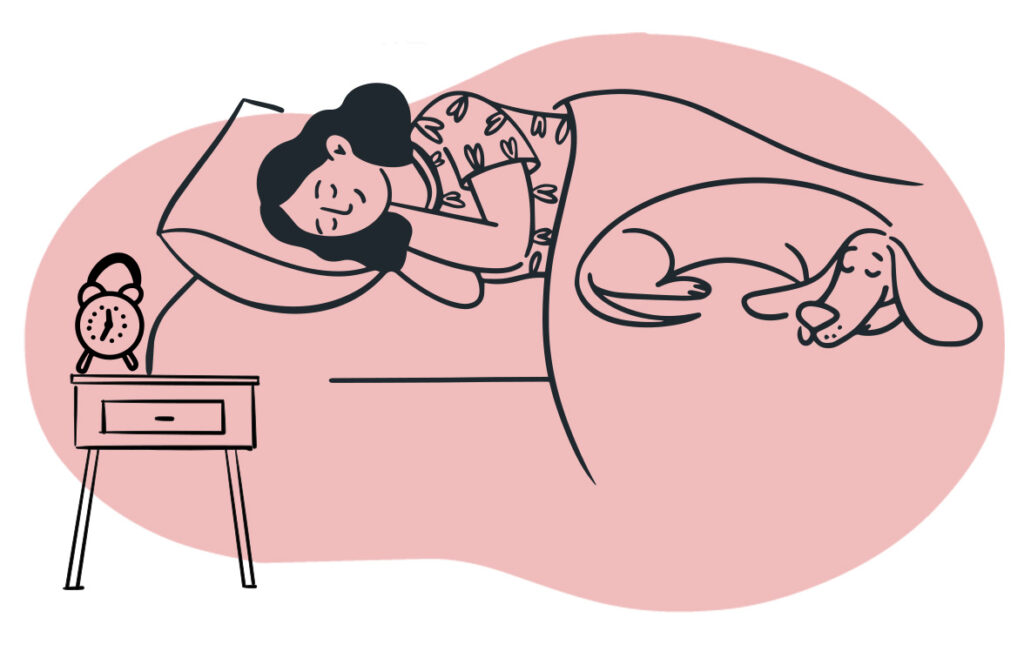Catching Up on Sleep: Sleep Debt Explained
Disclosure: By clicking on the product links in this article, Mattress Nerd may receive a commission fee at no cost to you, the reader. Read full disclosure statement.
Everyone has experienced the unshakable lethargy that comes with going to bed too late. Research shows that adults need 7 or more hours of sleep per night, and any less can lead to some serious consequences.
For years, the idea of making up for lost sleep was a pipe dream. But more and more evidence is emerging that supports this notion. So much so that the scientific community has dubbed it “sleep debt.”
And while we’re all too familiar with what a bad night of zzz’s feels like the next day, it’s only recently that science has validated something we’ve felt in our bones for decades: there may actually be such a thing as catching up on sleep.
So, what exactly is sleep debt—and how can you pay it off? Keep reading to find out.
What is Sleep Debt?
The Centers for Disease Control and Prevention defines sleep debt as “not getting adequate sleep over a series of days.” Say you need eight hours of sleep every night, but for the past week, you’ve only gotten five. By the end of the week, you’ll have accumulated a sleep debt of 21 hours.
That means even just one night of bad rest has a negative impact on your overall ability to function. The more you allow sleep debt to build, the more your body will begin to experience consequences. Getting more sleep is the only way to “pay down” this debt you owe to your body.
Of course, the amount of sleep you need each night to avoid sleep debt is different for everyone:
- Infants under 12 months old need at least 12 to 16 hours of sleep, including naps.
- Babies 1 to 2 years old need 11 to 14 hours of sleep, including naps.
- Kids 3 to 5 years old need 10 to 13 hours of sleep, including naps.
- Kids 6 to 12 years old need 9 to 12 hours of sleep.
- Teenagers 13 to 18 years old need 8 to 10 hours of sleep.
- Adults need at least 7 hours of sleep.

Is Sleep Debt Real?
Yes—sleep debt is very real. Anytime you sleep fewer hours than your body actually needs, you’re accruing sleep debt. And over time, that debt can have some seriously negative consequences on your health, both mental and physical.
In the short term, you might experience a foggy brain or terrible memory. And if you keep putting sleep on the back burner, you’ll open yourself up to worse consequences like insulin resistance and heart disease.
The good news is that you can pay it back—but not by sleeping in until noon for a single day. Getting a little extra snoozetime over the course of a few weeks or a few months is the only way to make a real dent in sleep debt. And the longer you let yourself run on fumes, the longer it will take to get back to a well-rested state.
Symptoms
Sleep debt is essentially chronic sleep deprivation. Because you’re getting some sleep, you likely won’t experience the most severe symptoms of sleep deprivation that occur when people go days without rest. But skipping out on sleep for just one night can put you at risk for a whole host of problems including:
- Daytime tiredness
- Fatigue
- Mood swings
- Depression
- Anxiety
- Low motivation
- Yawning
- Trouble thinking
- Poor memory
- Poor concentration
- Slow reaction times
- Headaches
Causes
Our modern, fast-paced world doesn’t necessarily set the stage for a good night’s sleep. In fact, lots of things can interfere with sleep and cause sleep debt, including:
- Sleep disorders like insomnia or sleep apnea
- An inconsistent sleep schedule due to work or school
- Shift work
- Having young children at home
- Traveling across time zones
- Illness
- Caregiving

How to Calculate Sleep Debt
It’s safe to say that almost everyone has some sleep debt to repay. And the only way to know how many hours you need to make up for is to first understand the amount of sleep you need.
Again, most healthy adults need between 7 to 9 hours every night. But there is a way to narrow down your optimal sleep number even further.
Start by finding out how many hours you actually sleep. Spend two weeks tracking the time you went to bed and the time you woke up. You can use either an app or just pen and paper.
Next, you’ll take a “sleep vacation” and spend two weeks going to bed at the same time and not having an alarm to wake yourself up. See when you naturally rise and calculate the number of hours you sleep each night.
Once you have both of these sleep numbers, you can find your sleep debt by subtracting the amount of sleep you actually got from the amount of sleep you need.
Can You Catch Up on Sleep?
Yes, it’s totally possible to catch up on the sleep you missed. But keep in mind that our circadian clocks are very sensitive. Depending on how much sleep you’ve lost, it can take some time for your body to bounce back.
Getting into the habit of tracking your sleep debt will not only give you an idea of your benchmark, but it will also help you monitor—and repay—your sleep debt over time.
How to Catch Up on Sleep
Once you’re aware of the total sleep debt you’ve racked up, it’s time to start repaying it. The best way to go about this is by making sleep a priority and setting some sleep goals.
Again, this will take time. Don’t expect just a few mornings of sleeping in to make up for years of sleep debt. That being said, a good place to start is allowing your body to sleep as much as it needs over the course of a few days. You’ll get a good idea of your best sleep rhythm, and from there, you can make a plan to tack on however many extra hours of sleep each night.
How Long Does Sleep Debt Last?
How long sleep debt will last really depends on how many lost hours you’ve experienced. However, research has shown it can take as many as four days to recover from just a single hour of lost sleep. That same study concluded that you may need a total of nine days of getting enough rest to fully eliminate sleep debt.

Tips to Get a Restful Night’s Sleep
Getting a good night’s sleep can be tough, but there are some things you can do to make it easier, such as:
- You can restrict electronics and blue light before bed to keep your internal clock from getting confused.
- Create a sleep-friendly environment by making sure your bedroom is dark, quiet, and cool and that you have a high-quality mattress.
- Establish a regular sleep schedule and avoid sleeping later than two hours past your normal wake-up time (even on weekends).
- Avoid drinks and food that will keep you up at night, like caffeine and alcohol, at least four before bed.
- Create a relaxing evening routine that signals to your body that it’s time to sleep, like reading or taking a bath.
- If you are going to nap, nap correctly, and don’t sleep longer than 20 minutes.
Final Thoughts
Sleep debt is a real thing, and it can have serious consequences for your health if it’s not repaid. So figure out how many hours your body really needs to feel rested and make sleep a priority. With a little more rest, you’ll be feeling better in no time.
Sources
Centers for Disease Control and Prevention. (2020). Sleep Debt. https://www.cdc.gov/niosh/emres/longhourstraining/debt.html
Cleveland Clinic. (2022). Sleep Deprivation. https://my.clevelandclinic.org/health/diseases/23970-sleep-deprivation#symptoms-and-causes
Division of Sleep Medicine at Harvard Medical School. (2008). Assess Your Sleep Needs. https://healthysleep.med.harvard.edu/need-sleep/what-can-you-do/assess-needs
Kitamura S, et al. (2016). Estimating individual optimal sleep duration and potential sleep debt. https://pubmed.ncbi.nlm.nih.gov/27775095/
Mayo Clinic. (2021). How many hours of sleep are enough for good health. https://www.mayoclinic.org/healthy-lifestyle/adult-health/expert-answers/how-many-hours-of-sleep-are-enough/faq-20057898
Webster M. (2008). Can You Catch Up on Lost Sleep? https://www.scientificamerican.com/article/fact-or-fiction-can-you-catch-up-on-sleep/